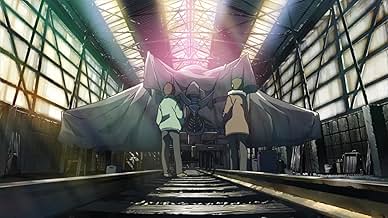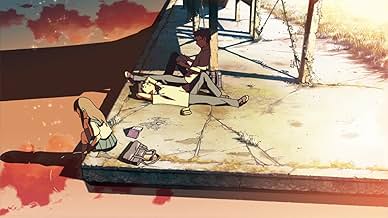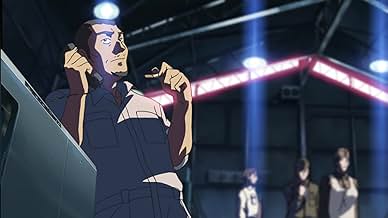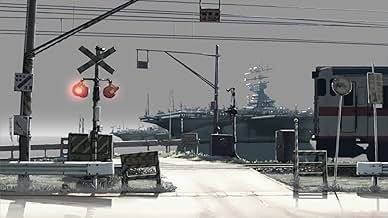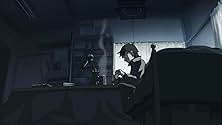IMDb RATING
6.8/10
16K
YOUR RATING
In an alternate postwar timeline, Japan is divided into the Union-controlled North and the US-controlled South.In an alternate postwar timeline, Japan is divided into the Union-controlled North and the US-controlled South.In an alternate postwar timeline, Japan is divided into the Union-controlled North and the US-controlled South.
- Awards
- 1 win & 1 nomination total
Yuka Nanri
- Sayuri Sawatari
- (voice)
- (as Yuuka Nanri)
Unshô Ishizuka
- Okabe
- (voice)
Kazuhiko Inoue
- Tomizawa
- (voice)
Risa Mizuno
- Maki Kasahara
- (voice)
Hidenobu Kiuchi
- Arisaka
- (voice)
Takeshi Maeda
- Daigakuinsei
- (voice)
- …
Rie Nakagawa
- Joshi Seito
- (voice)
- …
Yûki Nakao
- Joshi Seito
- (voice)
Maki Saito
- Joshi Seito
- (voice)
- (as Maki Saitou)
- …
Kousuke Kujirai
- Danshi Seito
- (voice)
Bretto Coleman
- Beigunjin
- (voice)
Ian O'Neal
- NSA
- (voice)
Featured reviews
While a popular anime, I find that the title (The Place Promised in Our Early Days) is more interesting than the slow, plodding script. Many will find this film unmoving and uneventful.
The animation is so-so. In only one scene (a mountain background with mist) was I impressed; otherwise it's very typical. I'm honestly surprised by the number of reviews stating this is "beautiful". It's really simply not that impressive animation-wise. I guess beauty really is in the eye of the beholder.
The characters are largely undeveloped. The plot line is simple and mono-directional, without much in the way of suspense, surprise or emotional impact. There are no highs or lows, no real climax to the film, and the ending is weak.
I am a fan of anime and very much enjoy artistic anime. I don't need giant robot battles in order to enjoy a film-- and enjoy many aspects of the drama genre where story is as important as the animation itself. But this work struck me as mediocre in all aspects. I do appreciate that some may enjoy the (very)subdued romantic aspect, but I found it as undeveloped and uneventful as the rest of the work.
As would be expected I give it 5 stars. Neither impressive nor bad... just a slow-moving story, weak plot line and so-so animation.
The animation is so-so. In only one scene (a mountain background with mist) was I impressed; otherwise it's very typical. I'm honestly surprised by the number of reviews stating this is "beautiful". It's really simply not that impressive animation-wise. I guess beauty really is in the eye of the beholder.
The characters are largely undeveloped. The plot line is simple and mono-directional, without much in the way of suspense, surprise or emotional impact. There are no highs or lows, no real climax to the film, and the ending is weak.
I am a fan of anime and very much enjoy artistic anime. I don't need giant robot battles in order to enjoy a film-- and enjoy many aspects of the drama genre where story is as important as the animation itself. But this work struck me as mediocre in all aspects. I do appreciate that some may enjoy the (very)subdued romantic aspect, but I found it as undeveloped and uneventful as the rest of the work.
As would be expected I give it 5 stars. Neither impressive nor bad... just a slow-moving story, weak plot line and so-so animation.
Makoto Shinkai's feature film debut packs a number of elements that would later become his trademarks but its confusing plot, inconsistent flow & poor characterisation also makes it pretty much forgettable. An ambitious undertaking by the new filmmaker in town that exposes his inexperience as a storyteller and presents him biting off more than he can chew.
Makoto Shinkai is unique in his directing style in that he often places more focus on a character's inner thoughts rather than his or her dialogue and interacting with the environment. While this style has its own set of strengths and weaknesses, Shinkai uses it to his advantage to often show a emotion driven story. Such as is here in "The Place Promised in our Early Days." It is not a good as some of his other efforts, but it is still worth the watch nonetheless. The story is about three friends living in a alternate reality Japan. Japan has been split in have by America who controls the south and "the Union" controlling the north. There is a tower that goes beyond the clouds and the three friends make a promise to go fly up to it using a plane that they salvage and start to repair. One day, one of the friends disappear and story follows the other two friends and how they cope and ultimately try to find and help her. Like I said, the setting is in a alternate history and there are some science fiction influences in the world. However, it does not detract from the highlight which is he story. The first part of the story involves the three friends enjoying their summer. It is so genuine in terms of emotion and the bright lighting and beautiful drawn environments really brings the story to life. The character animations is not the best and the voice acting is OK at best, but the environments themselves are so beautiful that you'll easily forgive the previous complaints. Shinkai excels at portraying emotions of lost and isolation, especially when it involves old friends and lost lovers. It is no exception here. The main character is the most developed here as we hear his inner thoughts the most and his desire to see his lost friend again is interesting. As much as I like this movie, it is hard not to compare it to another Makoto Shinkai film, "5cm per Second." The reason I like that film better is because there was nothing that distracted the main story. It was clear and to the point with nothing distracting. Same can't be said for this movie. There is a lot of background here involving politics and a weird dream/ parallel universe science that gets convoluted and messy and at times, it can get distracting. That being said, if you want a movie with genuine emotion, this is not a bad watch. In a age where anime tends to focus less on story and more and cutesy hi jinks and everyday nonsense of high school students who can't get a girl, "The Place Promised in our Early Years" is a refreshing, emotional, and occasionally beautiful film that won't leave and tears in your eyes, but might leave you staring at the screen even after the credits start rolling.
10StarAxis
This is an anime movie done by a relative newcomer to films: Makoto Shinkai, whose only previous directorial work was a half-hour short called "Voices of a Distant Star," in which he did all the animation himself on one laptop (even for Japan, a nation of workaholics, that was unheard of). It made him so famous that they gave him a full studio to work with for his next project, and when Makoto Shinkai doesn't have the constraints that a solo project would bring, look out.
The style of the film and its sci-fi and fantasy themes is equal parts steampunk and cyberpunk, with the film taking place in an alternate timeline of post-war Japan, only a few years from now. The main differences are the division between the North and South sides of Japan, and the research into parallel universes that has sprung up, resulting in the construction of a massive tower in Ezo (Hokkaido), which understandably captures the imagination and curiosity of the surrounding world.
Though the film is ostensibly a science fiction work, the plot involving a tower and alternate realities and so on plays second fiddle to the romantic drama, about three high school kids torn apart by war. The emotions blend with the fantasy elemts in a way that is handled with incredible elegance, care and sensitivity, and Makoto Shinkai's trademark poetic touch.
But what is more impressive is how the film shows that drama can be achieved through implausible situations. You see, too many directors think that in order to make a film "dramatic" and "touching," it must be about REALISTIC people in a REALISTIC setting having REALISTIC problems with REALISTIC resolutions, but Makoto Shinkai realizes a way around that, and uses a science fiction element not as a platform for action sequences, but rather as a way to achieve a kind of drama that you really couldn't get in a film that takes place in the "real world."
The film is aware that the sci-fi is playing second fiddle to the character drama, and doesn't waste any more time than it needs to trying to explain the film's bizarre sciences or justify the contrivances, rather leaving it up to the viewer to interpret and decipher what the fantasies of the film mean or symbolize. In other words, Shinkai wisely avoids the deathtrap of "Movie Science," and instead allows the audience to take things as they come and explain them ourselves.
The part about two teenagers building a plane that could get past a government-built radar system does seem a bit incredible, but this film does reflect on the incompetence of governments and how easy it is to get past them, so the required suspension of disbelief isn't really that big (I wish I found it hard to believe that a couple of teenagers could get past a bureaucratic governmental system in this day and age at all).
Also, the brief violence and "thrilling" assault on the tower are treated with perfect sincerity. The brief fight scenes are breathtaking in their realism and how they show that when someone gets punched, they get hurt. There are no legendary martial arts techniques or complex laser-rifle technology here, this film is about how people feel about each other and what they do when they are in trouble.
The ending is slightly abrupt and somewhat open-ended (although it is happy), but that is a theme in many anime. A lot is left up to the audience's interpretation and imagination, and the film only answers the questions that really matter.
The style of the film and its sci-fi and fantasy themes is equal parts steampunk and cyberpunk, with the film taking place in an alternate timeline of post-war Japan, only a few years from now. The main differences are the division between the North and South sides of Japan, and the research into parallel universes that has sprung up, resulting in the construction of a massive tower in Ezo (Hokkaido), which understandably captures the imagination and curiosity of the surrounding world.
Though the film is ostensibly a science fiction work, the plot involving a tower and alternate realities and so on plays second fiddle to the romantic drama, about three high school kids torn apart by war. The emotions blend with the fantasy elemts in a way that is handled with incredible elegance, care and sensitivity, and Makoto Shinkai's trademark poetic touch.
But what is more impressive is how the film shows that drama can be achieved through implausible situations. You see, too many directors think that in order to make a film "dramatic" and "touching," it must be about REALISTIC people in a REALISTIC setting having REALISTIC problems with REALISTIC resolutions, but Makoto Shinkai realizes a way around that, and uses a science fiction element not as a platform for action sequences, but rather as a way to achieve a kind of drama that you really couldn't get in a film that takes place in the "real world."
The film is aware that the sci-fi is playing second fiddle to the character drama, and doesn't waste any more time than it needs to trying to explain the film's bizarre sciences or justify the contrivances, rather leaving it up to the viewer to interpret and decipher what the fantasies of the film mean or symbolize. In other words, Shinkai wisely avoids the deathtrap of "Movie Science," and instead allows the audience to take things as they come and explain them ourselves.
The part about two teenagers building a plane that could get past a government-built radar system does seem a bit incredible, but this film does reflect on the incompetence of governments and how easy it is to get past them, so the required suspension of disbelief isn't really that big (I wish I found it hard to believe that a couple of teenagers could get past a bureaucratic governmental system in this day and age at all).
Also, the brief violence and "thrilling" assault on the tower are treated with perfect sincerity. The brief fight scenes are breathtaking in their realism and how they show that when someone gets punched, they get hurt. There are no legendary martial arts techniques or complex laser-rifle technology here, this film is about how people feel about each other and what they do when they are in trouble.
The ending is slightly abrupt and somewhat open-ended (although it is happy), but that is a theme in many anime. A lot is left up to the audience's interpretation and imagination, and the film only answers the questions that really matter.
Mind-bending sci-fi is a staple of Japanese animation, and many of them are complex in a way that makes them difficult to grasp immediately. This one, though, I really don't think the director has any idea how to tell a story. The film is just never coherent. Not only is its science fiction premise (which deals with alternate universes) never clear, nor its world comprehensibly established, but it's terrible at establishing characters and their relationships to each other. All of the characters are quite thin and clichéd. The artwork is nice(the animation is a bit choppy, though), and the music is pretty (but also occasionally too sappy), but this is an annoying mess of a film.
Did you know
- TriviaMakoto Shinkai intended to draw the background art himself but with an estimated 1000 cuts needed this would have been impossible for Shinkai to do alone and the film's animation producer, Kiyonori Hiramatsu went to Tokyo Art University to scout for artists. Adding to complications, many of the students were recruited from oil painting classes and had no experience in creating digital backgrounds and many hadn't even used PCs before.
- GoofsEnglish subtitles spell prophecies (used as a noun) as prophesies (the verb).
- Quotes
Hiroki Fujisawa: [Narrating] Living alone, the nights seemed to last forever. When I couldn't pass the time effectively, I went to a nearby train station and pretended to wait for someone.
- Crazy creditsThere's a brief shot after the credits.
- ConnectionsFeatured in WatchMojo: Top 10 Underappreciated Anime Movies (2016)
- How long is The Place Promised in Our Early Days?Powered by Alexa
Details
- Release date
- Country of origin
- Official site
- Language
- Also known as
- Bên Kia Đám Mây, Nơi Ta Hẹn Ước
- Production company
- See more company credits at IMDbPro
Box office
- Gross worldwide
- $90,571
- Runtime1 hour 30 minutes
- Color
- Sound mix
- Aspect ratio
- 1.85 : 1
Contribute to this page
Suggest an edit or add missing content

Top Gap
What is the French language plot outline for The Place Promised in Our Early Days (2004)?
Answer


